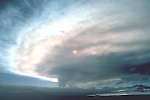
Effect on the
Atmosphere
The gases released from a volcanic eruption have been shown to have an effect on the atmosphere. As the gas particles enter the stratosphere there is an initially heating of the stratosphere, which leads to the cooling of the troposphere this will occur with in three months. Volcanic activity can cause both winter warming and summer cooling.
Location of the eruption is also important due to the atmospheric circulation patterns. Eruptions in the tropics and the poles are the most important, as these are key location for solar energy driving circulation.
Below is a picture of how SO2 causes air pollution. Large quantities of sulfur dioxide gas in the atmosphere can lead to volcanic air pollution. Sulfur dioxide gas reacts chemically with sunlight, oxygen, dust particles, and water to form volcanic smog, known as vog.

SO2 also effects the Earth's surface temperature. It has been shown that sulfur aerosols modify climate, warming the stratosphere and cooling the troposphere. Research has also shown that the liquid drops of sulfuric acid promote the destruction of the Earth's ozone layer.

Pictures obtained from http://volcanoes.usgs.gov/Hazards/What/Volgas/volgas.html without permission.